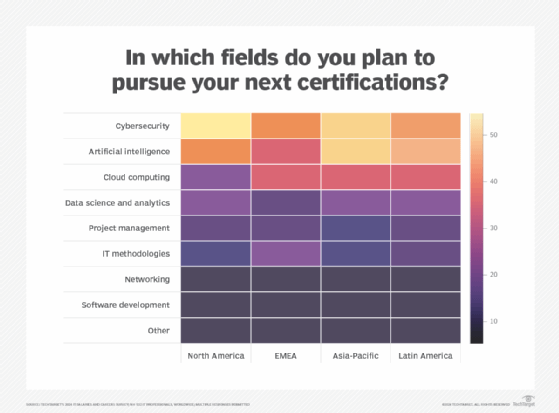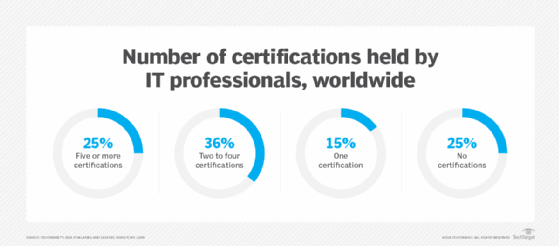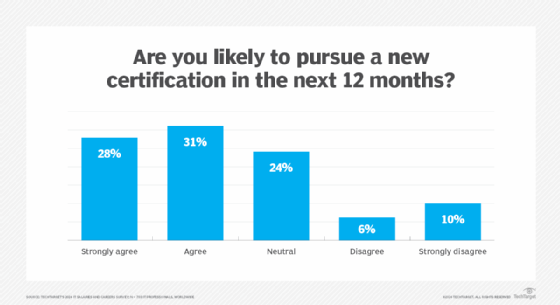
Getty Images/iStockphoto
Tech pros favor cybersecurity, AI certifications
Most IT professionals are likely to take on a new certification in the coming months, a TechTarget survey found. Cyber, AI, cloud and data science are the top pursuits globally.
IT professionals are focusing primarily on cybersecurity and artificial intelligence for their next tech certifications -- a pattern evident globally from recently released survey results.
TechTarget's annual survey on IT salaries and careers, conducted earlier this year, questioned more than 1,000 respondents to assess the state of tech certifications across the North America, EMEA, Asia-Pacific and Latin America regions. Three-quarters of the tech professionals polled have at least one certification, and 59% of a more targeted group of 703 respondents said they were likely to pursue a new certification within the next 12 months.
Forty-eight percent of 532 respondents planned to pursue cybersecurity as one of their next certifications, making it the most popular choice worldwide. AI certifications ranked second, with 41% identifying that as a goal. Cloud computing placed third at 33%, followed by data science and analytics at 22%. The question on certification plans permitted multiple responses.
Cybersecurity certifications reflect perennial IT concern
Cybersecurity is, unsurprisingly, a top certification priority for enterprises, given the perennial demand for technical talent in that field. Abhinaya Tayi, CIO at Forwardis, a freight forwarding company with headquarters in Berlin, Germany, placed cybersecurity as the top certification priority for her IT team. That emphasis aligns with the company's leading IT concerns.
"One of the biggest challenges I see is cybersecurity [and] the current rise in ransomware," she said.
Tayi said ISACA's Certified Information Security Manager and ISC2's Certified Cloud Security Professional rank among the top cybersecurity certifications of interest to the organization.
Cloud certifications are another priority -- one that's intertwined with cybersecurity, Tayi noted. Her IT group uses the Microsoft Azure cloud for a lot of design and development work, so being certified on the resource management, design and security aspects of the platform is important. But cross-cloud knowledge is also valuable, she added.
"In general, I think it's good to be certified on any kind of cloud [platform] -- AWS, Google or Azure," she said.

AI certifications gain traction
In the TechTarget survey, AI emerged as a prominent target for upcoming certifications. But there are somewhat fewer options available compared with more established fields such as cybersecurity and cloud. That's especially the case for generative AI (GenAI). HR professionals are bumping into that issue as they evaluate technology talent, according to tech careers website operator Dice.
"Hiring managers and recruiters often rely on formal certifications to determine whether candidates have the necessary mix of experience and skills for the job," Dice CEO Art Zeile said. The lack of "clear benchmarks" in complex fields such as GenAI make it difficult for HR professionals to assess technical skills, he noted.
Dice's 2024 "Tech Sentiment Report," published in September, points to a lower level of assurance when it comes to assessing AI skills. The report, which surveyed 390 HR professionals, found that 84% considered themselves extremely or very knowledgeable when recruiting technology professionals. But 73% of the respondents felt the same way about their knowledge of AI professionals.
The skill-assessment outlook, however, is beginning to improve as more AI certifications emerge.
"There are already several certification programs available, but the landscape is still developing," said Quynh Nguyen Ba, senior vice president and head of the Asia-Pacific and Japan market at Hitachi Digital Services, the technology services subsidiary of Japan-based Hitachi Ltd.
An alternate route for technologists
Certification plus practical experience is one approach tech employees might take. But some IT professionals find certification in a particular technology or field unnecessary. A quarter of the technology professionals TechTarget surveyed worldwide reported having no certifications.
Educational background is one reason. Tayi, for example, focused on organizational design and project management when she got her MBA at the Frankfurt School of Finance & Management. As a result, she didn't see a need to pursue a project management certification. She went on to hold project management roles at several companies before becoming CIO at Forwardis, where she drives digital transformation initiatives.
"Everything was already there in my master's degree, and that gave me that push to move into project management," Tayi said.
Nguyen cited online courses and specializations that focus on generative adversarial networks and natural language processing, pointing to Coursera and Udemy as two providers. He also listed cloud platform providers such as AWS, Google Cloud and Microsoft, noting the vendors' certifications cover their GenAI APIs and services. In addition, he mentioned Databricks, a data analytics platform vendor, as offering a GenAI engineering certification.
Zeile cited Microsoft's Azure AI Engineer Associate, the AWS Certified Machine Learning -- Specialty, and Google Cloud's Professional Machine Learning Engineer as examples of specific AI certifications.
Academic institutions also now offer an AI training track. Andy Lin, CEO at Provoke Solutions, a technology services company based in The Colony, Texas, said he has seen a recent uptick in executive education programs on GenAI from universities such as Columbia, Harvard and MIT. Those programs stem from the schools' earlier certification programs in traditional AI.
"In the last six months to a year, they have really expanded certification to include generative AI," Lin said.

Cloud, data offer AI pathway
Some technology professionals aren't prepared to head directly to AI or GenAI certification. Instead, they might follow a stepwise progression that starts with other technologies and builds from there.
Tayi said she encourages such an approach, citing data science certification as an initial step toward AI programs. Becoming a data engineer is another natural starting point for tech employees at Forwardis, which accumulates GPS location and customer data, she noted.
A similar pattern has emerged at Hitachi Digital Services.
"Most of our staff are seeking certifications for the roles of cloud architect, data engineer and data analyst," Nguyen said.
The momentum behind those certifications will continue for months, if not years, according to Nguyen. But AI and GenAI will lend weight to the data and cloud certifications, providing differentiation as employees pursue those tracks, he added.

Certification benefits and limitations
Certification plays multiple roles in the technology industry.
For tech employees, certification validates their skills, boosts career prospects improves job performance and offers professional recognition, Nugyen said. Employers benefit from a higher level of expertise among employees, increased productivity and a sharper competitive edge. In addition, businesses that encourage certification show a commitment to professional growth that helps with employee retention, he said.
Sixty-seven percent of the 6,166 respondents Dice polled for its most recent annual technology salary report, published in January 2024, identified training and education as an important workplace benefit, Zeile noted.
Certification provides foundational knowledge that can help tech workers reskill in a rapidly changing market. But hands-on experience is also critical, according to Lin.
"What is going to be important is people applying what they learned," he said.
Practical experience is particularly important in areas such as generative AI. Different GenAI tools call for different prompt engineering techniques and challenges specific to particular use cases add another layer of complexity, Lin said. Prospective GenAI specialists "won't learn the nuances" from a certification program, he contended.
"Adding or subtracting a word from a prompt can make a huge difference," he said. "You have to go out there and play with these tools."
John Moore is a writer for TechTarget Editorial covering the CIO role, economic trends and the IT services industry.







